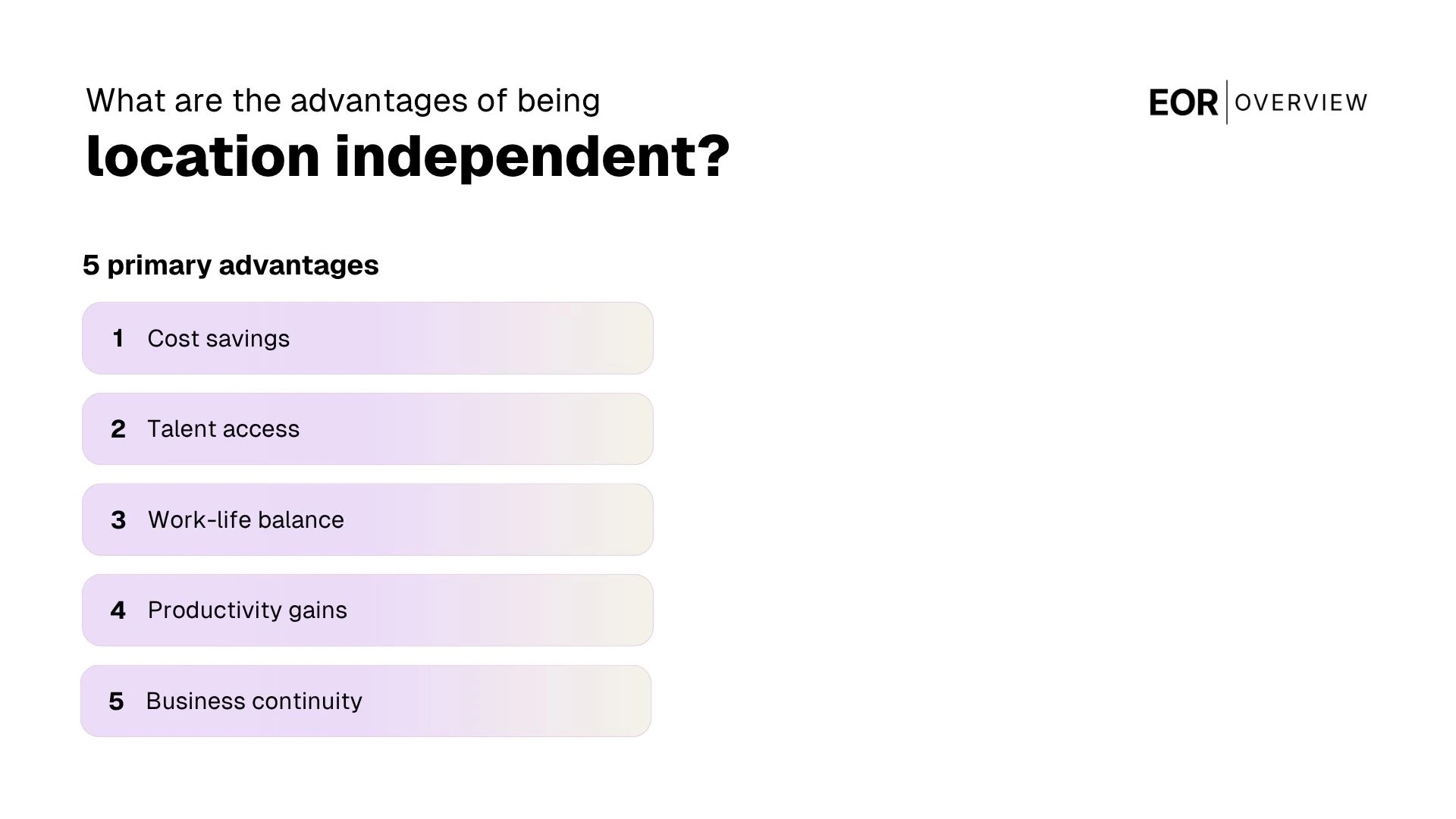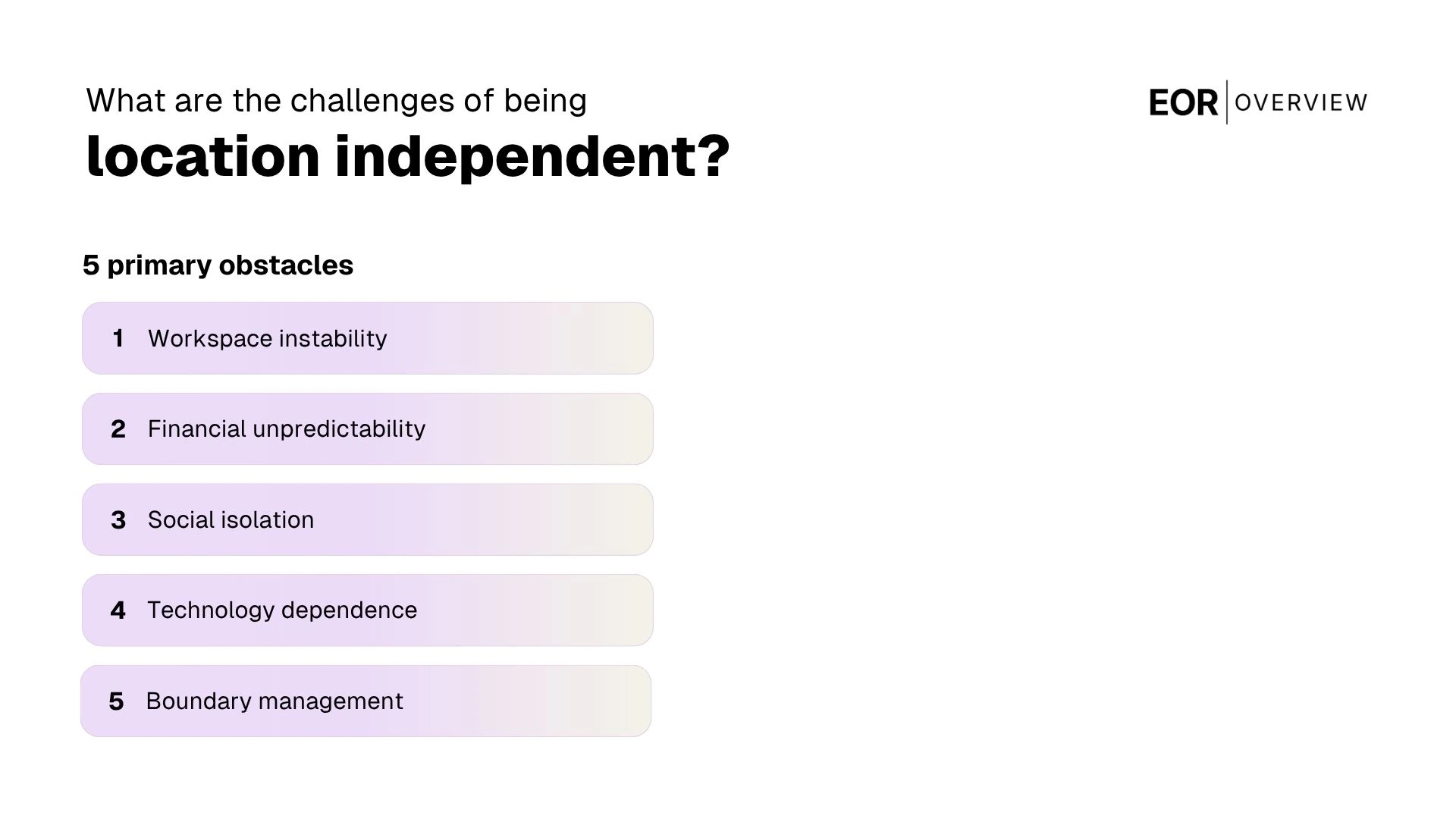Location independence is a strategic workforce approach that enables employees to perform their roles effectively from any geographic location, providing organizations with access to global talent pools while offering workers unprecedented flexibility in where they choose to live and work.
For HR and hiring managers in tech, finance, and startup environments, embracing location independence isn't just about keeping up with trends—it's about gaining a competitive edge in talent acquisition and retention. This approach allows you to tap into specialized skills regardless of proximity to your headquarters, reduce overhead costs, and create more resilient business operations that can adapt to market changes and global disruptions.
Companies that fully embrace location-independent hiring models report access to talent pools that are significantly larger than traditional geographic constraints would allow, fundamentally transforming how they compete for top performers in today's knowledge economy.
What is location independence?
Location independence is a work arrangement that enables professionals to perform their job responsibilities from any geographic location with reliable internet connectivity. This flexible approach to business operations has transformed how organizations think about talent acquisition and employee retention in the modern workforce.
For hiring managers in tech, finance, and startup environments, location independence represents a strategic advantage in accessing global talent pools. Rather than limiting recruitment to specific metropolitan areas, your organization gains the freedom to hire the best candidates regardless of their physical location or time zone preferences.
This approach fundamentally changes the traditional employer-employee relationship by prioritizing outcomes over physical presence. Employees can travel, relocate, or maintain their preferred lifestyle while delivering consistent results for your business. The model particularly appeals to skilled professionals who value autonomy and work-life integration over conventional office-based arrangements.
Location independence differs from standard remote work policies because it removes geographic restrictions entirely. While remote work often requires employees to remain within specific regions for legal or operational reasons, true location independence allows team members to work from anywhere in the world, provided they meet performance expectations and maintain appropriate communication during agreed-upon hours.
How can you be location independent?
Achieving location independence requires a strategic approach that aligns your career with your desired lifestyle. The foundation starts with developing skills that translate across borders and time zones. Focus on building expertise in areas like digital marketing, software development, financial analysis, or project management—competencies that companies value regardless of where you're physically located.
Your next step involves positioning yourself as a location-independent professional within your current organization or industry. Begin by demonstrating exceptional results in remote work scenarios and proposing pilot programs that showcase your ability to maintain productivity while working from different locations. Many tech and finance companies are increasingly open to these arrangements when presented with clear performance metrics and communication protocols.
Start your location independence journey while still employed full-time. Use vacation days to test working from different countries, documenting your productivity and any challenges you encounter. This real-world data becomes powerful evidence when negotiating permanent remote arrangements.
The practical aspects of becoming location independent means establishing systems that support your live and work philosophy. This includes securing reliable internet connectivity, understanding tax implications for different countries, and creating routines that maintain work-life balance regardless of your living situation.
Successful location-independent professionals often choose base locations strategically, considering factors like cost of living, internet infrastructure, and time zone compatibility with their primary clients or employers.

What are the advantages of being location independent?
Location independence offers numerous advantages including cost savings, talent access, work-life balance, productivity gains, and business continuity. These benefits transform how organizations attract talent and how remote workers structure their professional life.
These advantages are listed in detail below.
Cost savings: Remote workers can live anywhere with lower living costs while maintaining their salary, effectively increasing their purchasing power and quality of life.
Talent access: Organizations can hire the best people regardless of geographic location, expanding their talent pool beyond local markets and traditional office boundaries.
Work-life balance: Digital nomad lifestyles and flexible location arrangements allow professionals to design their ideal environment, reducing stress and improving job satisfaction.
Productivity gains: Many remote workers report higher productivity when working from their preferred locations, free from office distractions and lengthy commutes.
Business continuity: Location-independent teams provide natural disaster recovery and operational resilience, as work continues regardless of local disruptions or challenges.
The online nature of modern work makes location independence increasingly viable across tech, finance, and startup environments. While this freedom presents the challenge of managing distributed teams, the money saved on office overhead and the expanded talent pool often outweigh operational complexities.

What are the challenges of being location independent?
Location independence brings significant challenges that can impact both professional productivity and personal well-being. The freedom to live and work from anywhere often creates unexpected complexities around workspace stability, financial planning, and work-life balance that traditional office workers rarely face.
The primary obstacles include workspace instability, financial unpredictability, social isolation, technology dependence, and boundary management. These challenges are detailed below.
Workspace instability: Finding reliable internet and quiet environments becomes a daily concern when your laptop is your office, unlike having a dedicated home base or traditional office space.
Financial unpredictability: Managing fluctuating rent costs, currency exchanges, and varying cost of living across different locations creates budgeting complexities.
Social isolation: Missing the personal connections and spontaneous interactions that come from a consistent office environment can impact mental health and professional networking.
Technology dependence: Relying entirely on digital tools and internet connectivity means technical failures can completely halt productivity without office IT support.
Boundary management: Maintaining work-life balance becomes challenging when every place becomes both your home and office, making it difficult to establish clear personal boundaries.
Establish a location rotation schedule with 2-3 month stays in each place. This provides enough time to settle into productive routines while maintaining the flexibility that makes location independence attractive.
Location independent vs digital nomad
While these terms are often used interchangeably, location independence and digital nomadism represent distinct approaches to remote work. Understanding the difference helps hiring managers set appropriate expectations and policies for their distributed teams.
Location independent professionals work from wherever they want but typically maintain a stable home base and consistent routine. They might work from their home office, local co-working spaces, or coffee shops, but they don't constantly travel. This approach allows them to maintain regular schedules that align with their team's time zones while creating an optimal work environment.
Digital nomads, by contrast, embrace constant travel as a lifestyle choice. This popular approach involves working while moving between different cities, countries, or continents. However, frequent location changes can create challenges with time zone coordination and reliable internet access.
Stability: Location independent workers maintain consistent routines while nomads frequently change locations
Communication: Location independent professionals typically stay within compatible time zones, while nomads may work across multiple zones
Infrastructure: Location independent workers can invest in a dedicated workspace, while nomads must adapt to varying internet access and work environments
For roles requiring regular collaboration or where team members need to be physically present for certain activities, location independence often proves more practical than full nomadism.
What are the popular location independent careers?
Location independence means the freedom to work from anywhere with a reliable internet connection, whether that's a beachside café in Thailand or your home office. Technology has created numerous career paths that don't require the traditional office environment, offering professionals the advantages of being location independent while maintaining productive careers.
These flexible career options span multiple industries and skill levels, from creative freelancers to strategic consultants. The daily operations of these roles rely primarily on digital tools and communication platforms rather than physical presence.
Software developer: Build applications, websites, and systems remotely with just a laptop and strong internet connection.
Digital marketing strategist: Develop and execute marketing campaigns for clients across different time zones and markets.
Content writer and copywriter: Create written materials for businesses, from blog posts to marketing copy, with flexible deadlines.
Graphic designer: Design visual content for brands and businesses using cloud-based design software and collaboration tools.
Virtual assistant: Provide administrative support to executives and entrepreneurs through digital communication channels.
Online consultant: Offer specialized expertise in areas like business strategy, HR, or finance through video calls and digital deliverables.
Data analyst: Analyze business data and create reports using cloud-based analytics platforms and visualization tools.
Customer success manager: Manage client relationships and ensure satisfaction through digital touchpoints and regular check-ins.
While these careers offer flexibility, consider compliance requirements for your industry and tax obligations when working across different countries or states.

